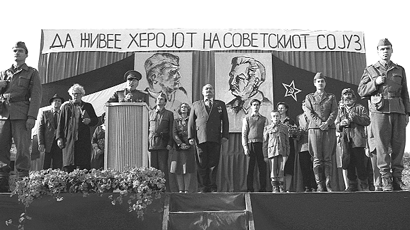A Macedonian orphan’s passage into old age as a political survivor
The first few minutes of “The Great Water” hold a promise that the rest of the film does not keep. Over credits introducing the names of its Macedonian, Czech, Slovak and American production companies, noise grinds and grates, as if the print’s soundtrack were ancient and worn. Doctors race an elderly patient on a gurney through a hospital. Breathing heavily, a child walks through a field. One soon finds out that the old man and boy are the same person. As more credits roll, the camera passes swiftly over a blue landscape, which resembles an abstract painting. It’s a fine, energetic start for a film that turns out to be stale and hackneyed.
An elderly Macedonian politician, Lem Nikodinkoski (played as an adult by Meto Jovanovski, dubbed into English by Croatian actor Rade Serbedzija), is wheeled into a hospital. While being treated, he reminisces about his experiences as a 12-year-old orphan (played by Saso Kekenovski) just after World War II when control over Yugoslavia became a tug-of-war between Stalin and the nationalist hero Marshal Tito.
The orphanage, a harsh place, dedicated to political “reprogramming,” is ruled by Comrade Ariton (Mitko Apostolovski) and his assistant Comrade Olivera (Verica Nedeska), a vindictive young woman. Bereft of friends and affection, Lem bonds with Isak, a 13-year-old boy (Maja Stankovska, who is actually female) prone to acts of defiance. They become blood brothers, but an angry action by Lem puts both boys’ futures at risk.
Cinematographer Suki Medencevic has never seen a blue or brown filter that he didn’t like. Initially, the film’s use of color is rather pointed––the brown matches the shade of uniforms and dust. It quickly grows obvious and tiresome, especially when Medencevic switches to blue to indicate that something out of the ordinary is happening. More often than not, the brown simply indicates that the action is taking place in the past. Like many extreme stylistic devices, the color scheme wears out its welcome through overuse. I wonder if there’s a single shot that Medencevic photographed without altering the natural color.
The film is gritty without ever pretending to capture unmediated reality. The orphanage’s surroundings are actually a series of locations 100 miles apart, cleverly edited together. At its most interesting, its tone comes close to Latin American magic realism. Despite the voice-over of a man on his deathbed, it’s anything but nostalgic. However, its shifts in mood are jarring and ill-considered, as spiritual impulses collide with the grounding influence of Italian neo-realism and the desire to do justice to the orphanage’s hopeless atmosphere.
“The Great Water” is filled with a mystical air, accompanied by plenty of Christian symbolism. Communism attempted to take the place of organized religion, wiping out centuries of tradition overnight, and Lem’s orphanage is no exception. Owning a cross is cause for punishment. Perhaps because of this prohibition, the boys take refuge in faith; Isak even seems to have the supernatural powers of a Christ- like figure.
“The Great Water” doesn’t lack ambition, but it feels over-directed and micromanaged. As in his use of color, Trajkov goes for effects that work momentarily but don’t ultimately sustain themselves. Kekenovski’s performance is one of the film’s strengths, but the character is defined mostly by his silence and dazed stare. Part of the problem may lie in the fact that the script, although adapted from a groundbreaking novel written in the early 1970s, is contemporaneously set. The film juggles its two time periods clumsily, using narration to make the present-day sections seem more central than they really are to the story. Since the adult Lem is a politician, the film touches briefly and superficially on the concerns of Macedonia’s new democracy. For Eastern Europeans, there may be something cathartic in Trajkov’s excavation of some of their past’s worst moments, but ultimately his film feels confused and scattered.
gaycitynews.com


































